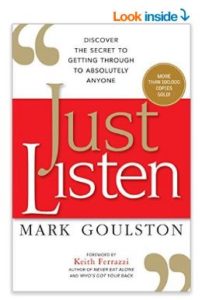Podcast: Play in new window | Download
Subscribe: RSS
Episode 23 – Learn to Intentionally Listen and Learn
“The world is giving you answer each day. Learn to listen.” – Unknown
There is a significant difference between hearing and listening. I discovered the best definition of the differences on a website called The Difference Between, “Hearing is the act of perceiving and receiving sound waves or vibrations through the ear. Listening is the act of hearing a sound and understanding what you hear.”
Do you know someone who hears that you’re speaking but never seems to be listening?
I think we all know someone like that. It can become frustrating and lead to arguments and disagreements especially emphasizing that they weren’t listening.
WE REMEMBER
10% of what we read
20% of what we hear
30% of what we see
50% of what we see and hear
70% of what we discuss with others
80% of what we personally experience
95% of what we teach others
– Edgar Dale
Studies have shown that we remember approximately 25 to 50% of what we hear. I find this statistic shocking. It is the time we do something different. It is the time that we become intentional with our listening so we can learn. How much more would you accomplish if you took the time to truly listen?
“We have two ears and one mouth and we should use them proportionally.”
― Susan Cain, Quiet: The Power of Introverts in a World That Can’t Stop Talking
One of the principles of the 7 Habits of Highly Effective People written by Stephen Covey states, “Seek First to Understand, Then To Be Understood”. Intentional listening begins when we focus and listen to what the other person is saying. It is the ability to put aside any distracting thoughts and truly be present. If we listen to our own thoughts we’re going to want to interrupt the other person and share our ideas or solutions of what we have done because we have this fear of losing our thoughts. This is where the arguments and disagreements come in because are thinking too far ahead and were not really listening to what is being said.
Arguments and disagreements are a reactive approach to conversation versus a responsive approach. When emotions are high, our brains move into a “fight or flight” response. Your amygdala, a small area of your brain, reacts to protect you and shuts down other areas of the brain that would otherwise analyze the threats. Psychologist Daniel Goleman refers to this as the boiling over point or that amygdala hijack where the intelligent part of your brain is no longer in control and you no longer reason with what’s being said. You cannot often reason with someone who is gone past their boiling point. You can learn to choose the words that you use to meet a person where they are at and truly listen to understand where they’re coming from, what their expectations are, what their hopes and fears are to really gain a clear picture of a situation.
“Most people do not listen with the intent to understand; they listen with the intent to reply.”
― Stephen R. Covey, The 7 Habits of Highly Effective People: Powerful Lessons in Personal Change
How Do I Begin?
There is so much more to listening than keeping your mouth closed and being silent. When you’re listening you are coming from a place of being nonjudgmental and simply curious about what the other person is saying. You let them know that you’re engaged through your body language by nodding your head and maintaining eye contact with them while they speak to demonstrate an interest in what they’re saying. You wait for the person who’s speaking for a pause to ask questions regarding what they said or to clarify what you been reading between the lines. You may paraphrase what they’ve said to ensure that your understanding what they’re saying.
Another way to truly understand what a person is saying is by putting yourself in another person’s shoes, being empathetic, and try to gain an understanding of what they might be thinking and feeling. You might want to repeat facts that you’ve heard or knowledge their emotions. You may say something like, “I am trying to get a sense of how you’re feeling … Are you feeling __________?” to ensure your perceptions are correct. When you do this you make people feel like they’re the most important person in the world and at the moment they should be if you’re truly listening.
 The book Just Listen: Discover The Secret To Getting Through To Absolutely Anyone by Dr. Mark Goulston is one of the best books out there on the topic of listening. He shares strategies and techniques that are designed to help you successfully communicate with anyone. He has trained the FBI and police hostage negotiators to handle life or death situations. The same tips and techniques can be used by you. One of the techniques he describes in the book is called The Persuasion Cycle that was inspired by James Prochaska and Carlo DiClemente from Their Trans-Theoretical Model of Change. Dr. Goulston states that you need to speak with a person in a manner that moves them.
The book Just Listen: Discover The Secret To Getting Through To Absolutely Anyone by Dr. Mark Goulston is one of the best books out there on the topic of listening. He shares strategies and techniques that are designed to help you successfully communicate with anyone. He has trained the FBI and police hostage negotiators to handle life or death situations. The same tips and techniques can be used by you. One of the techniques he describes in the book is called The Persuasion Cycle that was inspired by James Prochaska and Carlo DiClemente from Their Trans-Theoretical Model of Change. Dr. Goulston states that you need to speak with a person in a manner that moves them.
- “From resisting to listening
- from listening to considering
- from considering to willing to do
- from willing to do to doing
- from doing to glad they did it and continue doing.”
He believes that you can get through to absolutely anyone when you can have them buy into what you’re saying and it all stems back to listening.
Where Does it All Begin
You must truly understand yourself, your emotions, and what triggers you to react and circumstances versus respond. One of the things that Dr. Goulston says, “If you want to open the lines of communication, you must open your mind first.” It begins with suspending all judgment. When you remove judgment, everyone is on equal playing field and your mind is open to the possibilities.
One of the acronyms that we used in my coaching program was W.A.I.T.
If you start talking while another person is speaking, no one is listening. You learn so much more when you spend time listening intentionally.
When is Listening Important?
Listening is important in everything we do. Intentional listening can prevent misunderstandings, de-escalate and resolve conflict, discover solutions to problems. Listening is important in parenting in understanding the needs of your child.
Listening is important in leadership to learn what your people want and need. We need to learn a person’s preferences. An introvert may have different needs than an extrovert. The Disney Institute had an article about intentional listening in the workplace. They stated the importance of learning people’s preferences and gaining an understanding of whether they like to work individually or in a team or in a combination of both. By learning this information you can better suit the person to the role and the responsibilities that they need to fulfill. They will be more likely to be successful if they’re working in their preference. Resistance occurs when we have people doing things that do not suit them or do not align with who they are.
Listening is important in sales and understanding your customers wants and needs and learning whether or not you have the ability to fulfill them. When customers have complaints or want to vent, this is a great opportunity for learning. For when someone complains events about a situation, they often have a picture of what the ideal situation would be. It is up to you to learn what that is. If you listen with sincerity and interest in what they are saying, you may be able to resolve conflict easily and create a win-win situation.
Why is listening important to you? What are you listening to? What do you need to be listening for? Where in your life do you need to be more intentional with your listening?
Be intentional with your listening. There is more to listening that what you are hearing. When you listen to podcasts like this one, grab the show notes when you can. Choose to take action or integrate one of your learnings into who you are or how you want to show up in the world.
There is a big difference between what you hear and what you listen to learn and understand!
I would love to hear about how intentionally listening has impacted your life. E-mail me at Debra@DebraKasowski.com. Thank you for listening to The Millionaire Woman Show where we talk about leadership, business, and human potential to help you live rich from the inside out. Subscribe to The Millionaire Woman Show. Give us a 5-star rating! Sign up for our Newsletter www.debrakasowski.com
DEBRA KASOWSKI, BScN CEC is an award-winning best-selling author, transformational speaker, blogger, and Certified Executive Coach. She has a heart of a teacher and is certified in Appreciative Inquiry and Emotional Intelligence. Her writing has been published in a variety of print and online magazines. Debra Kasowski International helps executives, entrepreneurs, and organizations boost their productivity, performance, and profits. It all starts with people and passion. Sign up the Success Secrets Newsletter and get your free mp3 download today! www.debrakasowski.com
Time: 12:23 min

Leave a Reply